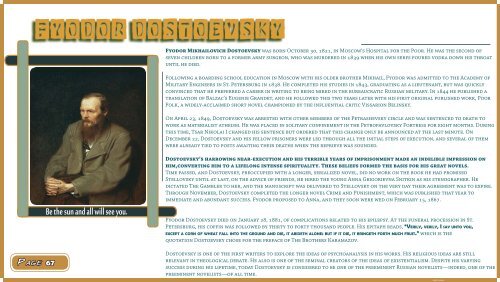You also want an ePaper? Increase the reach of your titles
YUMPU automatically turns print PDFs into web optimized ePapers that Google loves.
Fyodor Dostoevsky<br />
Fyodor Mikhailovich Dostoevsky was born October 30, 1821, in Moscow's Hospital for the Poor. He was the second of<br />
seven children born to a former army surgeon, who was murdered in 1839 when his own serfs poured vodka down his throat<br />
until he died.<br />
Following a boarding school education in Moscow with his older brother Mikhail, Fyodor was admitted to the Academy of<br />
Military Engineers in St. Petersburg in 1838. He completed his studies in 1843, graduating as a lieutenant, but was quickly<br />
convinced that he preferred a career in writing to being mired in the bureaucratic Russian military. In 1844 he published a<br />
translation of Balzac's Eugenie Grandet, and he followed this two years later with his first original published work, Poor<br />
Folk, a widely-acclaimed short novel championed by the influential critic Vissarion Belinsky.<br />
On April 23, 1849, Dostoevsky was arrested with other members of the Petrashevsky circle and was sentenced to death to<br />
work as materialist atheism. He was placed in solitary confinement in the Petropavlovsky Fortress for eight months. During<br />
this time, Tsar Nikolai I changed his sentence but ordered that this change only be announced at the last minute. On<br />
December 22, Dostoevsky and his fellow prisoners were led through all the initial steps of execution, and several of them<br />
were already tied to posts awaiting their deaths when the reprieve was sounded.<br />
Page 67<br />
Be the sun and all will see you.<br />
Dostoevsky’s harrowing near-execution and his terrible years of imprisonment made an indelible impression on<br />
him,converting him to a lifelong intense spirituality. These beliefs formed the basis for his great novels.<br />
Time passed, and Dostoevsky, preoccupied with a longer, serialized novel, did no work on the book he had promised<br />
Stellovsky until at last, on the advice of friends, he hired the young Anna Grigorievna Snitkin as his stenographer. He<br />
dictated The Gambler to her, and the manuscript was delivered to Stellovsky on the very day their agreement was to expire.<br />
Through November, Dostoevsky completed the longer novel Crime and Punishment, which was published that year to<br />
immediate and abundant success. Fyodor proposed to Anna, and they soon were wed on February 15, 1867.<br />
Fyodor Dostoevsky died on January 28, 1881, of complications related to his epilepsy. At the funeral procession in St.<br />
Petersburg, his coffin was followed by thirty to forty thousand people. His epitaph reads, “Verily, verily, I say unto you,<br />
except a corn of wheat fall into the ground and die, it abideth alone: but if it die, it bringeth forth much fruit.” which is the<br />
quotation Dostoevsky chose for the preface of The Brothers Karamazov.<br />
Dostoevsky is one of the first writers to explore the ideas of psychoanalysis in his works. His religious ideas are still<br />
relevant in theological debate. He also is one of the seminal creators of the ideas of existentialism. Despite his varying<br />
success during his lifetime, today Dostoevsky is considered to be one of the preeminent Russian novelists—indeed, one of the<br />
preeminent novelists—of all time.<br />
Abhi Sharma


